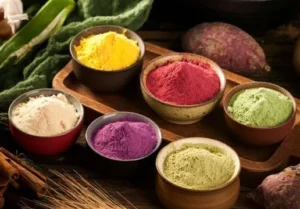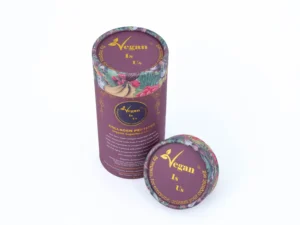In recent years, the beauty and wellness industries have seen a significant surge in interest surrounding collagen, a protein that plays a crucial role in maintaining the health of our skin, hair, nails, joints, and more. Traditionally, collagen has been sourced from animals, but with the rise of veganism and plant-based lifestyles, there has been a growing demand for vegan collagen. This blog will delve into everything you need to know about vegan collagen, including what it is, how it works, its benefits, and how it compares to traditional collagen. We’ll also explore the best vegan collagen products on the market, including Veganisus Vegan Collagen Peptides, and provide tips on how to boost collagen production naturally.
What is Collagen?
Collagen is the most abundant protein in the human body, making up about 30% of the total protein content. It is a key structural component of connective tissues, including skin, tendons, ligaments, and bones. Collagen provides strength and elasticity to the skin, helps in wound healing, and supports joint health. There are at least 16 types of collagen, but the majority of collagen in the body is Type I, II, and III. Type I collagen is found in the skin, tendons, and bones; Type II in cartilage; and Type III in reticular fibres, such as in the bone marrow and lymph nodes. As we age, our bodies produce less collagen, leading to common signs of ageing such as wrinkles, sagging skin, and joint pain. This has led to the popularity of collagen supplements, which are often derived from animal sources like bovine (cow) or marine (fish) collagen.
What is Vegan Collagen?
Vegan collagen is a plant-based alternative to traditional collagen supplements. Unlike animal-derived collagen, which is extracted from the bones, skin, and connective tissues of animals, vegan collagen is made using genetically modified yeast and bacteria. These microorganisms are engineered to produce the same collagen-building blocks (amino acids) found in human collagen. Another approach to vegan collagen involves using plant-based ingredients that promote the body’s natural collagen production. These ingredients are rich in vitamins, minerals, and antioxidants that support collagen synthesis, such as vitamin C, zinc, and silica.
How Does Vegan Collagen Work?
Vegan collagen works in two primary ways:
- Direct Supplementation: Some vegan collagen products are designed to provide the body with the necessary amino acids and peptides that mimic the structure of human collagen. These products are often created using bioengineered yeast or bacteria that produce collagen proteins identical to those found in humans.
- Collagen Boosting: Other vegan collagen products focus on enhancing the body’s natural collagen production. They contain plant-based ingredients that provide the nutrients needed for collagen synthesis. For example, vitamin C is essential for the conversion of proline into hydroxyproline, a key component of collagen.
Benefits of Vegan Collagen
- Supports Skin Health
One of the most well-known benefits of collagen is its ability to improve skin health. Collagen helps maintain skin elasticity, hydration, and firmness. Vegan collagen can help reduce the appearance of fine lines and wrinkles, improve skin texture, and promote a more youthful complexion. - Promotes Joint Health
Collagen is a major component of cartilage, the tissue that cushions joints. Supplementing with vegan collagen can help support joint health, reduce inflammation, and alleviate symptoms of conditions like osteoarthritis. - Strengthens Hair and Nails
Collagen is also important for the health of hair and nails. Vegan collagen can help strengthen brittle nails, reduce hair breakage, and promote healthier, shinier hair. - Supports Gut Health
Collagen plays a role in maintaining the integrity of the gut lining. Vegan collagen can help support gut health by promoting the repair of the intestinal lining and reducing inflammation in the digestive tract. - Ethical and Sustainable
For those following a vegan or plant-based lifestyle, vegan collagen offers an ethical and sustainable alternative to animal-derived collagen. It avoids the environmental and ethical concerns associated with animal farming and fishing.
Vegan Collagen vs. Traditional Collagen
| Feature | Vegan Collagen | Traditional Collagen |
|---|---|---|
| Source | Plant-based or bioengineered yeast/bacteria | Derived from animal bones, skin, and fish scales |
| Environmental Impact | Sustainable and cruelty-free | High carbon footprint, ethical concerns |
| Allergen Potential | Less likely to cause allergies | Potential allergens (marine or bovine sources) |
| Effectiveness | Supports natural collagen production | Provides direct collagen peptides |
One of the best plant collagen blend available today is Veganisus Vegan Collagen Peptides. This premium plant-based collagen booster is formulated with 11 organic superfoods designed to support skin, hair, nail, and joint health naturally. Key ingredients include:
- Alfalfa – Rich in vitamins and minerals that promote collagen synthesis.
- Banana – Provides essential nutrients for skin hydration.
- Lucuma – Packed with antioxidants to fight free radicals.
- Moringa – A powerful plant rich in amino acids and vitamins.
- Raw Cacao – Contains polyphenols that support skin health.
- Olive Leaf – Known for its anti-inflammatory and anti-ageing properties.
- Gooseberry – A potent source of vitamin C for collagen production.
- Coconut Milk – Nourishes the skin from within.
- Wheat Grass – Packed with chlorophyll and essential minerals.
- Gotu Kola – Supports circulation and collagen renewal.
- Goji Berry – Provides antioxidants and supports skin elasticity.
How to Boost Collagen Production Naturally
While collagen supplements can be a helpful addition to your routine, there are several natural ways to support and enhance your body’s collagen production. A holistic approach, combining diet, lifestyle, and skincare habits, can maximise collagen synthesis. Below are some actionable tips to help you boost collagen naturally:
1. Eat a Collagen-Boosting Diet
Your diet plays a vital role in providing your body with the essential nutrients needed for collagen production. By incorporating foods rich in specific vitamins, minerals, and amino acids, you can support collagen synthesis and maintain the integrity of your skin, joints, and other connective tissues.
Vitamin C-Rich Foods
Vitamin C is a key nutrient in collagen production because it helps convert amino acids like proline and lysine into hydroxyproline and hydroxylysine, which are essential for collagen stability. Collagen production is significantly enhanced when your body has an adequate supply of Vitamin C. Collagen-boosting foods rich in Vitamin C include:
- Citrus fruits like oranges, grapefruits, and lemons
- Strawberries and kiwi
- Bell peppers (especially red peppers)
- Broccoli and Brussels sprouts
- Spinach and kale
Amino Acid-Rich Foods
Collagen is primarily made up of amino acids, the building blocks of protein. To create collagen, your body needs a sufficient supply of specific amino acids like glycine, proline, and hydroxyproline. Consuming foods high in protein ensures your body has enough of these amino acids to form collagen. Amino acid-rich foods include:
- Legumes such as lentils, beans, and peas
- Nuts and seeds, including almonds, chia seeds, and pumpkin seeds
- Tofu and other soy products
- Eggs, particularly the whites, which are rich in proline
- Chicken and fish, which contain collagen-building amino acids
Zinc and Copper-Rich Foods
Zinc is essential for collagen synthesis as it plays a role in the formation of collagen peptides. Copper is also important, as it helps the body crosslink collagen fibres, contributing to the strength and stability of collagen structures. Zinc and copper-rich foods include:
- Pumpkin seeds and chickpeas (rich in zinc)
- Cashews and sunflower seeds (rich in zinc)
- Shellfish, such as oysters, and organ meats (rich in copper)
- Whole grains, mushrooms, and green leafy vegetables (rich in copper)
Silica-Rich Foods
Silica, a trace mineral, is essential for collagen formation and helps maintain its structural integrity. It works synergistically with other minerals and nutrients to support healthy connective tissue. Silica-rich foods include:
- Cucumbers
- Green beans
- Leafy greens like spinach and kale
- Whole grains and oats
2. Stay Hydrated
Collagen requires water to maintain its structure and function. Dehydration can affect the elasticity and firmness of your skin, as well as the health of your joints and connective tissues. Staying hydrated throughout the day helps support collagen production and maintains your skin’s moisture levels. Tips for staying hydrated:
- Drink plenty of water throughout the day.
- Consider adding electrolytes to your water for better hydration (found in coconut water or electrolyte tablets).
- Hydrate your skin from the outside by using moisturising creams or oils that lock in water and keep your skin supple.
3. Protect Your Skin from Sun Damage
Excessive sun exposure can break down collagen fibres in the skin, leading to premature signs of ageing such as wrinkles and sagging. UV rays from the sun can damage collagen by increasing the production of free radicals, which degrade collagen proteins. Protect your skin by:
- Applying broad-spectrum sunscreen with SPF 30 or higher, even on cloudy days.
- Wearing a wide-brimmed hat to shield your face from direct sun exposure.
- Seeking shade during peak sun hours (10 AM to 4 PM).
4. Avoid Smoking and Excess Alcohol
Smoking and excessive alcohol consumption can negatively impact collagen production. Smoking introduces toxins that degrade collagen and prevent the body from producing healthy collagen. Alcohol dehydrates the skin and impairs the absorption of important vitamins and minerals needed for collagen synthesis, particularly vitamin C. To protect collagen production:
- Avoid smoking and limit exposure to second-hand smoke.
- Minimise alcohol consumption, or choose to consume alcohol in moderation (if at all).
- Replenish lost nutrients by eating a diet rich in vitamins and minerals that support collagen.
5. Get Enough Sleep
Collagen production peaks during sleep as the body repairs itself. While you sleep, the body works to regenerate skin, tissues, and cells, including collagen-producing cells. Poor sleep can hinder this natural process, leading to reduced collagen production and accelerated signs of ageing. Sleep tips for collagen production:
- Aim for 7–9 hours of sleep each night.
- Maintain a consistent sleep schedule to regulate your body’s natural circadian rhythm.
- Create a relaxing pre-sleep routine to help you unwind, such as reading or meditating.
6. Exercise Regularly
Exercise is not only beneficial for overall health but also promotes collagen production. Physical activity increases blood circulation, ensuring that nutrients required for collagen production are delivered to the skin, joints, and connective tissues. Exercise tips for collagen health:
- Engage in aerobic exercises such as walking, running, or cycling to improve blood circulation.
- Include strength training in your routine, which can stimulate collagen production in muscles and joints.
- Stretching and yoga also promote flexibility and joint health, supporting collagen integrity.
7. Manage Stress Levels
Chronic stress can have a detrimental impact on collagen production by releasing cortisol, a stress hormone that can break down collagen and hinder its formation. Stress management practices like meditation, yoga, and breathing exercises can help lower cortisol levels and preserve collagen health. Stress management techniques:
- Practice mindfulness meditation for at least 10–15 minutes daily.
- Try deep-breathing exercises to calm the nervous system.
- Incorporate yoga or Tai Chi to relieve tension and boost collagen production.
8. Consider Collagen-Boosting Supplements
While not essential, certain supplements can support the natural production of collagen in the body. Vegan collagen peptides, such as Veganisus Vegan Collagen Peptides, contain ingredients like vitamin C, zinc, and silica, which are known to enhance collagen synthesis naturally.
The Science Behind Vegan Collagen
The science behind vegan collagen is fascinating. By using bioengineered yeast and bacteria, scientists can create collagen that is structurally identical to human collagen. This process involves inserting human collagen genes into these microorganisms, which then produce collagen proteins. This method not only provides a sustainable and ethical alternative to animal-derived collagen but also ensures the collagen produced is highly bioavailable and effective.
The Role of Antioxidants in Collagen Production
Antioxidants play a crucial role in collagen production and protection. They help neutralise free radicals, which can damage collagen fibres and accelerate the ageing process. Ingredients like Goji Berry, Raw Cacao, and Olive Leaf in Veganisus Vegan Collagen Peptides are rich in antioxidants, making them excellent for supporting collagen health.
The Importance of Vitamin C in Collagen Synthesis
Vitamin C is essential for collagen synthesis. It acts as a cofactor in the enzymatic reactions that convert proline and lysine into hydroxyproline and hydroxylysine, respectively, which are critical for collagen stability. Gooseberry, a key ingredient in Veganisus Vegan Collagen Peptides, is a potent source of vitamin C, making it an excellent choice for boosting collagen production.
The Environmental Impact of Vegan Collagen
One of the most significant advantages of vegan collagen is its minimal environmental impact compared to traditional collagen. Animal farming and fishing have substantial carbon footprints and contribute to deforestation, overfishing, and habitat destruction. Vegan collagen, on the other hand, is produced using sustainable methods that do not harm animals or the environment.
The Ethical Considerations of Vegan Collagen
For many people, the ethical considerations of using animal-derived products are a significant concern. Vegan collagen provides a cruelty-free alternative that aligns with the values of those who choose to avoid animal products. By opting for vegan collagen, consumers can support ethical practices and contribute to a more compassionate world.
How to Choose the Right Vegan Collagen Blend
When choosing a vegan collagen supplement, it’s essential to consider the following factors:
- Ingredients: Look for products that contain a blend of collagen-boosting ingredients like those found in Veganisus Vegan Collagen Peptides.
- Quality: Ensure the product is made from high-quality, organic ingredients.
- Bioavailability: Choose supplements that are easily absorbed by the body.
- Brand Reputation: Opt for reputable brands with positive reviews and transparent practices.
The Connection Between Gut Health and Collagen
Gut health is closely linked to collagen production. A healthy gut lining is essential for the absorption of nutrients needed for collagen synthesis. While supplements can be beneficial, diet also plays a crucial role in maintaining collagen health. A diet rich in fruits, vegetables, nuts, seeds, and legumes can provide the necessary nutrients for collagen production. Foods high in vitamin C, zinc, copper, and amino acids are particularly important therefore, Vegan collagen blend that support gut health, like Veganisus Vegan Collagen Peptides, can be particularly beneficial. With advances in biotechnology, vegan collagen is becoming more effective and widely available. As research continues, expect new formulations and innovative products to enter the market, providing even better plant-based solutions for collagen support. The future of vegan collagen looks promising, with potential applications in not just beauty and wellness, but also in medical fields such as wound healing and tissue engineering.
Is Vegan Collagen Effective ?
Vegan collagen is indeed revolutionising the beauty and wellness industries by providing a sustainable, ethical, and effective alternative to traditional animal-based collagen. With options like Veganisus Collagen Peptides, consumers can enjoy the benefits of collagen without compromising their plant-based values. By adopting a collagen-boosting diet and lifestyle, you can further enhance your skin, hair, joint, and overall health naturally. Explore Veganisus Vegan Collagen Peptides here and experience the benefits of plant-powered collagen support.







